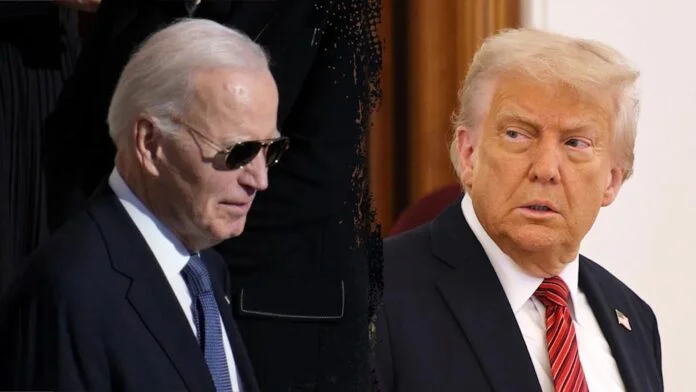Former President Donald Trump has once again sparked national conversation — and considerable backlash — after sharing a wild claim online suggesting President Joe Biden might have been “replaced” years ago.
The post, which Trump shared on his Truth Social account, was originally written by another user. The message alleged that Biden is no longer the original man the American people elected. Instead, it claimed, what we’re seeing now is a version of Biden made up of “clones, doubles, or robotic engineered entities.”
The implication? That the real Joe Biden has been gone since 2020 — and that this has been kept a secret from the American public.
A Post Without Words, but Loud in Impact
Trump did not add his own commentary to the repost. However, his action was far from neutral. By boosting the theory to his millions of followers, he gave it legitimacy in the eyes of many.
The original message claimed:
“There is no Joe Biden — he was [gone] in 2020. Biden clones, doubles, and robotic engineered soulless, mindless entities are what you see.”
It continued by suggesting that even top Democratic leaders are unaware of this supposed truth.
The theory is, by all credible accounts, completely unfounded. But in today’s media environment, even an unspoken endorsement can make such ideas go viral almost instantly.
A Familiar Pattern of Controversy
This is far from the first time Trump has ventured into the world of fringe ideas.
Throughout his time in politics, he’s shown a willingness — even an eagerness — to boost unproven claims. From the long-debunked “birther” story about President Obama to repeated allegations of voter fraud in the 2020 election, Trump has frequently cast doubt on official narratives.
This latest theory follows the same playbook: it’s attention-grabbing, implausible, and delivered without evidence.
Yet it reached millions — instantly.
Health News Sparks Online Speculation
The strange timing of the theory isn’t lost on political observers.
Just days before Trump’s repost, Biden publicly revealed he is undergoing treatment for a serious health condition. Though he assured the public he remains capable of serving, some critics jumped on the announcement to raise questions.
Trump himself had offered Biden well wishes in a public statement shortly after the diagnosis was revealed.
But within a week, he had turned from sympathy to spectacle.
By promoting the idea that the man leading the country isn’t actually Joe Biden, Trump reignited old rumors and fed into newer, darker suspicions — the kind that tend to fester online, often without basis.
Critics Call It Dangerous, Irresponsible
Late-night hosts and political analysts wasted no time in responding.
Jimmy Kimmel slammed the post on his show, saying, “This is so deeply nuts.” He added, “You can’t just say the president is a robot and call it a day.”
Political commentators warned that such theories don’t just reflect poor taste — they can damage national discourse.
Disinformation experts said posts like these erode trust in government and distract from real policy issues. They also worry it might normalize belief in wild ideas that have no grounding in fact.
Not the First “Clone” Theory in Politics or Pop Culture
This kind of claim may sound new, but it actually has a long, strange history.
Over the years, similar rumors have targeted celebrities and political figures. Paul McCartney was famously rumored to have been replaced in the 1960s. Pop star Avril Lavigne has been the focus of an online theory claiming she was switched with a look-alike. Even Vice President Kamala Harris has been targeted by digital hoaxes.
It’s all part of a broader trend — where conspiracy theories go mainstream through viral posts, often with no proof at all.
Why It Matters
The stakes here are higher than just online gossip.
When a former president, and current political figure, amplifies ideas like this — even without saying a word — it sends a message to millions.
To some, it may seem like a joke. To others, it’s a serious accusation.
And that’s the problem: conspiracy theories, even absurd ones, can take on a life of their own. They distract from meaningful conversations about health, leadership, and democracy. They erode confidence in elections and public institutions.
And they make it harder for people to agree on even the most basic facts.
The Bigger Picture: A Divided Media Landscape
Trump’s post isn’t just about Biden — it’s about where we are as a country.
In today’s political environment, social media is a weapon and a megaphone. One click can set off days of headlines. One retweet — or in this case, a repost — can bring fringe theories out of the shadows and into prime time.
It also reflects the fractured nature of American media, where people can choose to follow echo chambers that reinforce their beliefs — no matter how strange those beliefs may be.
Whether Trump meant the post as a joke, a jab, or something more serious, the fact remains: it reached millions. And it spread an idea with no basis in fact — one that questions the very identity of the sitting U.S. president.
In an age where truth often competes with clickbait and rumor, moments like this matter.
They show us how quickly misinformation can travel. And they remind us of the responsibility that comes with having a public platform — especially when that platform is as big as Donald Trump’s.


